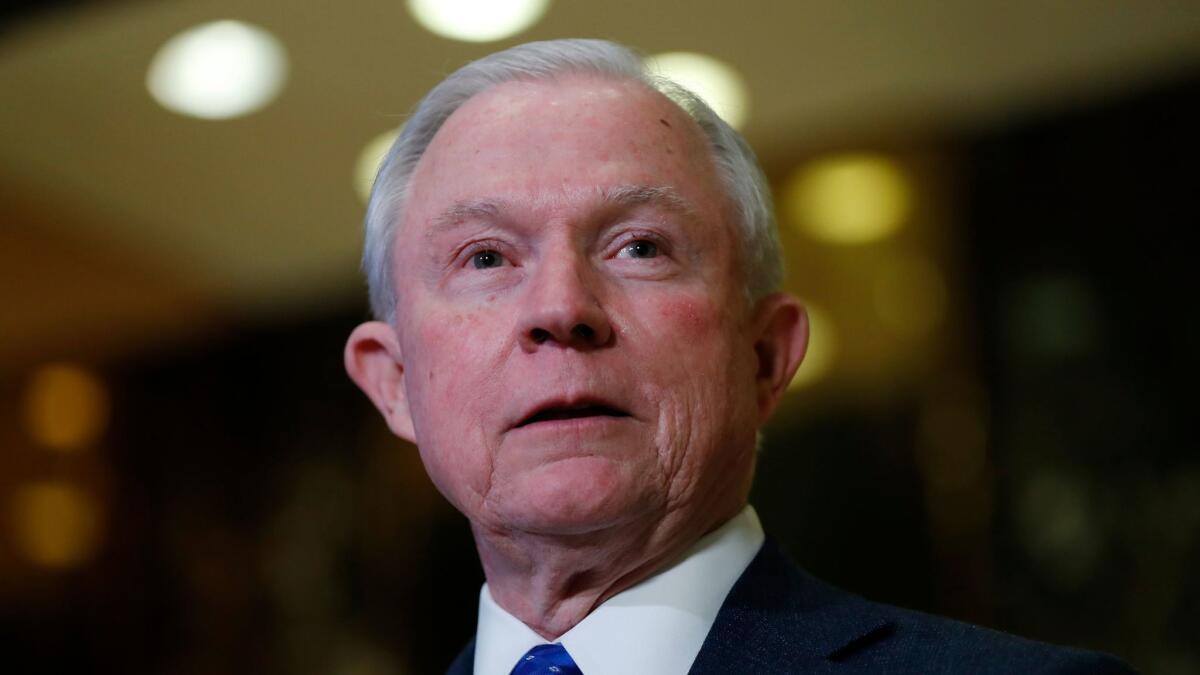Editorial: Trump’s first three appointees sound a lot like him, and that’s troubling

President-elect Donald Trump has announced his first appointments, and anyone who hoped that he would reach out to more mainstream voices in his party — or make a gesture to the majority of voters who didn’t support him — will be deeply disappointed. Trump campaigned on a platform of hostility toward immigrants and Muslims and portrayed his Democratic opponent as a criminal; the three appointees announced Friday share some or all of those noxious views.
Trump promised to change Washington, so it would be foolish to expect him to fill the executive branch with seasoned establishment figures. Nevertheless, he has promised to be the president for all Americans, and his appointments should reflect that.
For the record:
8:55 p.m. Jan. 8, 2025The original version of this editorial suggested that waterboarding is prohibited only by an executive order by President Obama. Congress included a similar prohibition in legislation authorizing national defense programs.
Retired Gen. Michael Flynn, Trump’s choice as national security advisor — a post that doesn’t require Senate confirmation — has been if anything more insulting to Muslims than the president he will advise. In February, Flynn, a former defense intelligence chief in the Obama administration who shares Trump’s fondness for Twitter, tweeted a YouTube video listing bombings committed by Muslims with the title “Fear of Muslims is RATIONAL.” He has reportedly referred to the Islamic faith as “a cancer” and a political ideology.
No one expects a Trump Justice Department to have the same policy priorities as Obama’s, but lax enforcement of civil rights laws isn’t an option.
Flynn also has served Trump with a rabid partisanship that has bewildered his former colleagues in the military. In a speech at the Republican National Convention endorsing Trump, a manic Flynn incited delegates who were calling for Hillary Clinton’s imprisonment. “Yeah, that’s right,” Flynn told them. “Lock her up.”
Sen. Jeff Sessions of Alabama, Trump’s choice for attorney general, was an early supporter of Trump’s campaign and, not coincidentally, has relentlessly opposed legislation that would provide a path to citizenship for immigrants living in the country illegally. More problematic is that Sessions led the charge against a rational and bipartisan immigration reform bill.
Sessions also is a troubling choice for those who expect the Justice Department to be vigilant about the protection of the civil rights of racial minorities. Thirty years ago the Senate Judiciary Committee rejected his nomination for a federal judgeship after allegations (which he denied) that he made racist remarks. On Friday the president of the NAACP Legal Defense and Educational Fund said that Sessions had a “decades-long record . . . of opposing civil rights and equality.”
To head the Central Intelligence Agency, Trump tapped Rep. Mike Pompeo of Kansas, a caustic critic of Hillary Clinton in connection with the deaths of four Americans in Benghazi — a partisan and disingenuous line of attack. Pompeo has also lamented the closure of secret CIA prisons overseas and opposed the Iran nuclear agreement, a deal that may not be perfect but is far better than the alternatives. On Thursday he tweeted: “I look forward to rolling back this disastrous deal with the world’s largest state sponsor of terrorism.” President Obama and many foreign-policy experts are trying to convince the president-elect not to follow through with his campaign promise to “renegotiate” the agreement.
The Flynn appointment is a fait accompli, but the Senate has an obligation to scrutinize the Sessions and Pompeo nominations to ensure that both appointees would abide by the law as written by Congress and not just indulge the whims of a willful president.
In Sessions’ case, he must overcome widespread skepticism about whether he is committed to use the power of the federal government to protect the rights of minorities, including the right to vote. No one expects a Trump Justice Department to have the same policy priorities as an Obama Justice Department, but lax enforcement of civil rights laws is not an option. If the Senate isn’t satisfied that Sessions will enforce the law, it should withhold its approval.
Given Trump’s comments on the campaign trail that he would “bring back a hell of a lot worse than waterboarding,” Pompeo should be asked whether he would insist that the CIA refrain from that practice — deemed a form of torture by the International Red Cross — and other so-called “enhanced interrogation techniques” employed during the George W. Bush administration. He should be asked specifically whether he would recommend that the Trump administration continue to abide by a 2009 executive order in which Obama directed that interrogators for the CIA (and every other agency) abide by Common Article 3 of the Geneva Conventions and the Army Field Manual. His previous comments on the issue suggest otherwise, which is alarming.
The president-elect has many more appointments to make, and it’s possible that they will move the administration in a more inclusive direction. We especially hope that Trump’s choices to head the State and Defense Departments will be able to counter Flynn’s influence with Trump, especially when it comes to relations with the Muslim world. But so far the Trump administration is looking less like a Lincoln-esque team of rivals than an echo chamber.
More to Read
A cure for the common opinion
Get thought-provoking perspectives with our weekly newsletter.
You may occasionally receive promotional content from the Los Angeles Times.










